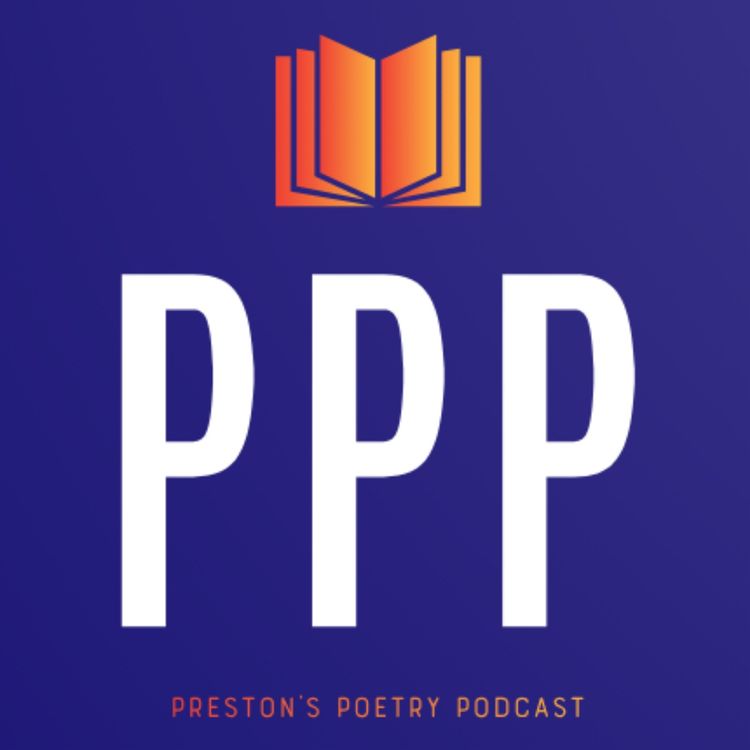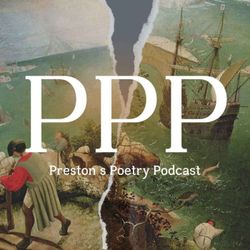Share

Preston's Poetry Podcast
15. Form Follows Function - "My Own Heart" by Gerard Manley Hopkins
Ep. 15
•
We'll be looking at a poem I revisit often. It has stuck with me through the years, and still to this day delivers. I quote it all the time. It's a poem that will enrich your life -- but poetically speaking, it's a good introduction to poetic form(s) because many of Hopkins' works have a kind of congruence and synchronicity between the content and the form. It's My Own Heart Let Me More Have Pity On.
NOTE: This episode was recorded on different equipment than usual. Let me know if you love it or hate it.
Production Gustav Worm-Leth
Outro Yentl Tijssens
More episodes
View all episodes

(Not an) Exam Special - "The Waste Land" by TS Eliot ft. Arjan Hut
01:40:46|It's a big special episode! Poet Arjan Hut and I sit down in front of a tin can to talk TS Eltiot's the Waste Land. It's a mixed language interview, and I'm leaving it that way because The Waste Land is too! If you listen on Apple Podcasts, you can get an automated translated transcript in the app.We talk collage form, the world in shambles, mixed language poetry, and what we like about this deck-o-tarot-cards poem written in 1922. Enjoy!Featuring Arjan Hut from Garbielle en Arjan bedoele it net ferkeardProducer Gustav Worm-LethOutro Yentl TijssensRecording - AbelPhoto: Niels Westra
26. 26. Villlanelles pt 2. - Michael Luis Medrano "Villanelle"
17:10||Ep. 26Part 2 of 2 on Villanelles, I'll be going stanza by stanza to show how the repetition of Villanelles can be used to create richer emotions. Using a living poet's Villanelle, Michael Luis Medrano harnesses the power of repetition to shed light on Chicano fatherhood."Villanelle" by Michael Luis Medrano, from Born in the Cavity of Sunsets (page 4) by Michael Medrano, © 2009Bilingual Press/Editorial Bilingüe.Production Gustav Worm-LethOutro Yentl Tijssens
25. 25. Villanelles pt 1 - Dylan Thomas "Do Not Go Gentle Into That Good Night"
27:21||Ep. 25In this episode, I'll be talking about how we can look at poetic forms and discover their internal benefits -- through a difficult form to write called a Villanelle. I'll discuss harnessing the power of repetition with Dylan Thomas' Do Not Go Gentle Into That Good Night.Production Gustav Worm-LethOutro Yentl Tijssens
24. 24. Couplets suck! (a Rant) - Robert Louis Stevenson "Land of Nod", Basil Bunting "Briggflatts", and Robert Frost "Nothing Gold Can Stay"
15:00||Ep. 24In this episode of Preston's Poetry Podcast ----- I'm wasting your time with a rant about why I (usually) hate couplets. It's also another "screw you" to some 19th-century poets, which is always nice. I'll be comparing the great couplet use of Robert Frost with Robert Louis Stevenson -- "Nothing Gold Can Stay" and "The Land of Nod" (respectively, the latter I hate.) Plus a cameo appearance of one of my favorites, "Briggflatts" by Basil Bunting.Producer Gustav Worm-LethOutro Yentl Tijssens
23. 23. Free Verse Form - "Small Kindnesses" by Danusha Lameris
21:12||Ep. 23We’ve also previously been talking about this dynamic interchange – what Hopkins calls counterpoint — between Form and Function, how truly great poems take on a form not because the form is important in itself but because the structure of the poem somehow reflects the subject matter. So, what about free verse? Today’s poem is a good example about how free verse itself can serve a function. Join me for "Small Kindnesses" by Danusha Lameris!Used with consent from the author.Production Gustav Worm-LethOutro Yentl Tijssens
22. 22. Censorship & Controversy - "the mother" by Gwendolyn Brooks
30:00||Ep. 22CONTENT WARNING: AbortionToday I'll be addressing a heavy but beautiful poem by Gwendolyn Brooks, "the mother." Some say it's a pro-, some say it's an anti-abortion poem. It's actually neither -- rather, it's a good example of what the role of the poet is in the middle of controversy, hatred, judgment, peril, and political divide.Used/Reprinted by Consent of Brooks PermissionsProducer Gustav Worm-LethOutro Yentl Tijssens
21. 21. Tradition (and its limits) - "We Real Cool" by Gwendolyn Brooks
25:04||Ep. 21In this episode, I will have the immense pleasure of introducing you to one of my all-time favorite poets, Gwendolyn Brooks. We'll be talking about "THE CANON" and how we can look to poets like Gwendolyn Brooks to know where the limits of our reverence for tradition should lie -- with a really cool, short, jazzy poem, "We Real Cool."Used/Reprinted By Consent of Brooks Permissions.-----Outro Yentl TijssensProducer Gustav Worm-Leth
20. 20. Haiku with Bashō and Ezra Pound
16:52||Ep. 20I'll be rapid-firing haiku! We'll talk about the history of Haiku (Hoku + Haikai) and how to read them! If you wanna check out more on Haiku, check out this great youtube video by Kent Morita and Takahiro Dunn.Guest starring: a teacher in Ibaraki Prefecture in Japan!Production Gustav LethOutro Yentl Tijssens
19. 19. Ekphrasis 2.2 - "Landscape with the Fall of Icarus", William Carlos Williams
12:04||Ep. 19In this two-part miniseries about two poets' takes on Pieter Bruegel's The Fall of Icarus (c. 1560), I'll be looking at William Carlos Williams' sober take in his Landscape with the Fall of Icarus.Intro: Johnny Loves MeProduction Gustav Worm-LethOutro Yentl Tijssens